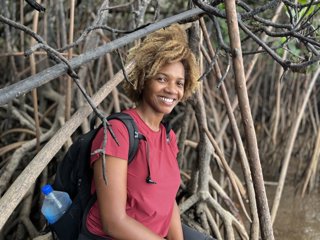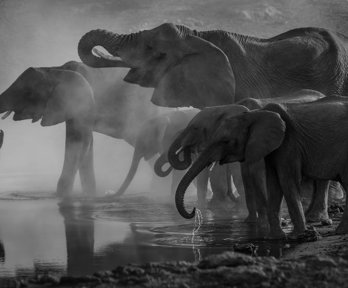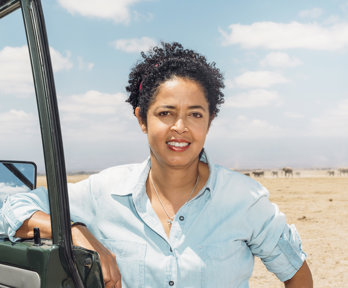The second annual Esmond B. Martin Royal Geographical Society Prize will be presented this evening to Dr Lola Fatoyinbo.
The Prize, created by a generous bequest from renowned conservationist Esmond Bradley Martin, recognises outstanding achievement by an individual in the pursuit and/or application of geographical research, with a particular emphasis on wildlife conservation and environmental research studies.
This year’s recipient, Dr Lola Fatoyinbo, is a Research Scientist in the Biospheric Sciences Lab at NASA Goddard Space Flight Center, where she develops and uses advanced remote sensing technologies and data to understand forested and coastal ecosystems.
As well as being an accomplished researcher with more than 60 scientific publications to her name, Lola is committed to conservation outcomes, partnering with organisations that protect ecosystems and ensuring her research informs policy decisions. Her work on airborne LiDAR and satellite imagery campaigns after Hurricane Irma in the Caribbean, the impact of oil exploration in the Niger Delta, and studies of mangrove forests across the Americas, Africa and Asia, have increased global understanding of some of Earth’s most critical systems and supported the voices of those that depend on them.
A leader in her discipline, Lola is also dedicated to training the next generation of scientists looking to understand and safeguard our planet, mentoring dozens of junior researchers in her lab.
On being awarded the Prize, Lola said: “I am deeply honoured and grateful to receive this award. Being the recipient right after Dr Paula Kahumbu, whose work and mission I admire, and in the name of Esmond Bradley Martin, is inspiring and humbling. This recognition also profoundly motivates me to continue producing the environmental data and knowledge that I believe will help protect life on our planet.”
The Society’s President and Chair of the awarding panel, Nigel Clifford, said: “Lola’s work exemplifies how geographical research has a real world impact. Her commitment to ensuring that scientific study influences policy shows true leadership in conservation and environmental research and makes her the perfect recipient for the Esmond B. Martin Royal Geographical Society Prize.”
The Society’s Monday night lecture this evening, Monday 8 April 2024, will be given by Dr Fatoyinbo, where she will address how careful research can be the foundation of progress towards a better world.
ENDS
Notes to editors
- For further media enquiries, images, or requests to interview Dr Lola Fatoyinbo, please contact the Society’s Senior Press and Communications Officer, Róisín Tarrant on +44 (0)77 1478 3126 or .
- About the Prize and Esmond Bradley Martin: The Esmond B. Martin Royal Geographical Society Prize was created thanks to a generous bequest to the Society by the renowned geographer and conservationist, Esmond Bradley Martin, following his untimely death. The Prize recognises outstanding achievement by individuals undertaking research into wildlife conservation and environmental studies, reflecting Esmond’s tireless work for the protection of wildlife and our natural environment. Esmond dedicated his life’s work to the investigation of the illegal trade in rhino products and ivory, and to efforts to end their use. He was United Nations Special Envoy for Rhinos in 1992-1993, and subsequently worked in dangerous markets monitoring the illegal trade in wildlife commodities. His pioneering work helped China to ban their domestic rhino horn trade in 1993 and their ivory trade in 2017. Esmond championed the importance of data for wildlife protection and undertook extensive fieldwork investigating the illegal trade in rhino horn and ivory – providing countries with the data required to shut down illegal markets. He believed that through a combination of strong governance, robust law enforcement and effective management, the long-term protection of wild populations of rhinos, elephants, and other species, as well as their natural habitats in Africa and Asia, could be realised.
- About the Royal Geographical Society (with IBG): The Royal Geographical Society (with the Institute of British Geographers) is the learned society and professional body for geography. Formed in 1830, our Royal Charter of 1859 is for 'the advancement of geographical science'. Today, we deliver this objective through developing, supporting and promoting geographical research, expeditions and fieldwork, education, public engagement, and geography input to policy. We aim to foster an understanding and informed enjoyment of our world. We hold the world's largest private geographical collection and provide public access to it. We have a thriving Fellowship and Membership and offer the professional accreditation 'Chartered Geographer’.
- About the Biospheric Sciences Laboratory: The Biospheric Sciences Laboratory at NASA Goddard Space Flight Center studies terrestrial ecosystems and their interactions with the atmosphere using multiscale remote sensing, mathematical modeling, and advanced analytical techniques. This research allows lab scientists to characterise and predict environmental changes due to natural and anthropogenic processes at local to global scales.




